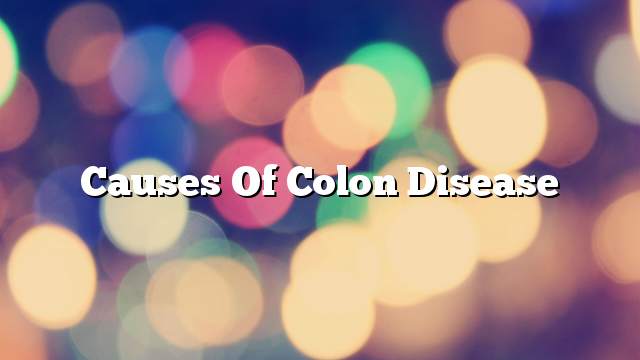Colorectal disease
The colon is part of the digestive system, which works to transport waste from the intestines to the rectum. The colon disease occurs when the lining of the colon is inflamed from the lower side. This part of the digestive tract is inflamed and is filled with acute ulcers that cause acute pain. The colon disease has two types, And gastrointestinal disease, and colon disease is one of the most common diseases common to humans.
Causes of colon disease
Today, the causes of colon disease are still not fully visible, but there are many reasons why the colon is inflamed and irritated.
- Nervous tension and emotional trauma.
- Psychological stresses, and great stress that harms the body.
- Anxiety, and continuous thinking.
- Hormonal changes that women get during their menstrual cycle.
- If a family history of colon cancer is found in the family, family members are more likely to become infected with the disease than others.
- Smoking, and eating alcoholic beverages.
- Food containing sulfur component, gaseous material.
- The food is very warm and the food is very spicy.
- Eat milk and some of its derivatives.
- Legumes and seeds of all kinds, and eating raw vegetables.
- Eat nuts heavily.
- Eat caffeine-rich foods such as tea and coffee.
- Eat foods that contain refined sugar.
- Take excessive doses of laxatives.
Symptoms of colon disease
The symptoms of this disease vary from person to person, and the general symptoms that appear on a person with a colon disease are as follows:
- Swelling in the stomach.
- Many abdominal pains and persistent cramps.
- Daily stomach acidity, and reflux to the esophagus.
- Depressed, moody.
- Significant changes in bowel habits.
- Diarrhea or severe and persistent constipation, and frequent mucus or blood in the stool.
- Weight loss is strange, loss of appetite.
- Bleeding and high temperature of the body in some severe cases.
Tips for treating colon disease
To prevent colorectal disease, or to treat the colon if you are a person with this disease, you should follow some guidelines that relieve you of pain and swelling and cramps within the digestive system, and these are:
- Follow a healthy diet to avoid irritation of the colon wall.
- Eat foods high in fiber because they help prevent constipation, prevent gas formation, and prevent stomach cramps.
- Avoid foods that cause inflammation of the colon.
- Drink herbs and medicinal seeds that help to relieve inflammation and pain.
- Take the painkillers and medicines that relieve the symptoms of colorectal disease and pain described by the doctor.
- Surgery to remove part of the inflamed colon in case of severe and severe colon inflammation.
